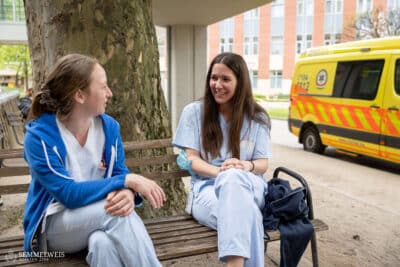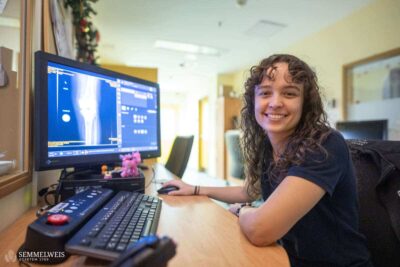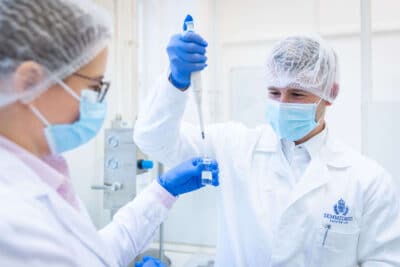The board amended certain provisions of the Organizational and Operational Rules. The decision concerns the replacement of the Employee Forum of the Employment Requirements System and the practical division of tasks between the Directorate of Student Services and the Alumni Directorate.
A decision has been made to establish the Semmelweis Technology Transfer Company (TTC) Plc., which is a company exclusively owned by Semmelweis University, supported by state funding for three years. The company aims to make the most efficient use of the intellectual property created at the university and to increase the market utilization of the university’s research core facility.
The organizational structure of the Directorate General of Medical Quality Assurance has changed, justified by the expansion of the Clinical Center’s organizational units and scope of care. Until now, the tasks have been carried out by three directorates (the Directorate of Health Management and Development, the Directorate of Nursing Management and Health Care Professional Training, and the Directorate for Health Care Organization), which now have been supplemented with an additional directorate. Furthermore, the former Directorate of Health Care Organization will continue to operate as the Directorate for Health Care Services, while retaining its tasks and powers. The Directorate for Health Care Organization was established as a new unit, with the main task of managing patient care and patient journeys.
The Senate has approved an amendment to the Clinical Research Trials Regulations, to comply with the clinical trials directive issued by the Ministry of Interior in 2023.
It was decided to introduce table tennis as an elective subject. The university’s Table Tennis Division was established in January 2024; and from September, students will have the possibility to take this sport as a two-credit course.
The board decided to amend the Student Standards and adopted the model rules of procedure for the Ethical and Disciplinary Committee. Among other things, the scope of the disciplinary procedure has been clarified and the procedure for minor offenses has been simplified. The Remuneration and Benefits Policy (TJSZ) has also been amended to harmonize the management of student claims and the procedural rules of the TJSZ.
The Study and Examination Regulations (TVSZ) have been amended. As part of Curriculum 2.0, the definition of the practical examination and the rules for organizing the examination have been clarified. Two courses previously promoted and registered by the Educational Authority, the Master’s degree in Health Data Science at the Faculty of Health and Public Administration (EKK) and the Active Aging training program at the EKK Institute of Mental Health, have been incorporated into the university regulations. In addition to the two new degree programs, the ways of awarding diplomas for the programs already included in the TVSZ have been revised, and at the proposal of the Alumni Directorate, from now on, in addition to graduates, alumni will also be eligible to apply for honorary certificates.
A new organizational unit is created by the name of Institute of Biostatistics and Network Sciences. The reason for the decision is that the number of students and courses at the Center for Translational Medicine is steadily increasing, with 350 PhD students expected to be trained here from the next academic year. To achieve this, and to improve MSc training, it is necessary to provide a stable biostatistics backup, which requires the establishment of a separate institute and a BSc/MSc in Data Science. One of the main tasks of the institute is to offer BSc and MSc courses in biostatistics and data science in English. The institute will also conduct research, supervise PhD students, and provide methodological support for university research.
The board adopted the provision on the organizational position of the recently affiliated departments (the Department of Neurosurgery, the Department of Rehabilitation Medicine, and the Department of Traumatology) and their associated departmental groups as well as the Department of Clinical Psychology. Accordingly, the Department of Neurosurgery and the Department of Neurointervention will be established within the Neurosurgery and Neurointervention Clinic at the Faculty of Medicine; the Department of Physical Medicine and Rehabilitation will be established within the Rehabilitation Clinic; while the Department of Traumatology will be merged into the Traumatology Clinic. The Department of Sports Surgery and Medicine will be dissolved, and two departments of neuro-traumatology will be merged. The Department of Clinical Psychology will continue to operate within the Psychiatry and Psychotherapy Clinic.
The Senate approved the amendments to the curricula of the Faculty of Medicine (ÁOK), the Faculty of Dentistry (FOK), the Faculty of Pharmaceutical Sciences (GYTK), and the Faculty of Health Sciences (ETK) within the framework of Curriculum 2.0. The curriculum reform was introduced in 2019 to balance theoretical and practical training and introduce block courses. The Curriculum 2.0 reform, which will enter into force from the academic year starting in September 2024, aims to further fine-tune the curriculum based on results so far. Representatives from each faculty gave a presentation on the renewal of their respective model curricula. The entire ÁOK curriculum was reviewed in terms of content; the integration of theory and practice and the appropriate alignment of subject content were monitored; the requirements, subject and credit allocation, and subject mergers and swaps were reviewed; the range of electives was expanded; assessment and closure forms were examined and modified where necessary; and the clinical work of students was reviewed and streamlined. At the FOK, the continuous assessments gained more emphasis, along with more practice-oriented, small-group courses; the range of optional subjects was extended; the curriculum was aligned with the curriculum of the ÁOK; the criteria requirements were adjusted to the corresponding semesters and the course syllabi were also updated. From the academic year 2024/2025, the faculty will introduce two curricula, one for years I-II-III and another for years IV-V, reflecting the differences regarding the Semmelweis Symposium and the language proficiency requirements. At GYTK, the system of prerequisites and the number of seminars and practical classes have been fine-tuned to reduce drop-outs; the content of courses has been harmonized and overlaps eliminated; new courses have been introduced to improve career orientation. Students’ problem-solving and decision-making skills have been enhanced; digitalization and cooperation (with pharmacies, industry, public authorities, and start-ups) have been improved. At the ETK, the new curriculum has made education more practice-oriented and efficient, the curriculum is structured more favorably; drop-out rates have decreased; the requirements have become more flexible; the training system has been adapted to the labor market; the pool of well-trained professionals is expected to increase further and the social prestige of allied health professionals may be further enhanced.
The board was informed about organizational changes below the directorate level. These concern the ÁOK, the Directorate of Dormitories, the Directorate General of Financial Management, the Directorate General for Finance, the Directorate of Educational Networking Management, and the Directorate of HR Controlling and Career Management, and mainly include clarifications in compliance with the previous amendment of the Organizational and Operational Rules.
The Rules on the Awarding of Honors and Prizes have been amended, which concern the Semmelweis University’s Outstanding Teacher Award and Outstanding Allied Health Professional Award. The rules for the former have been simplified, while the number of possible recipients of the latter has been increased from 30 to 40 per year.
The senators decided on Doctor Honoris Causa title recipients, the 2025 nominees for awards presented by the state and ministries, the conferral of the Pro Universitate Award, and the Semmelweis University’s Outstanding Teacher Award. The senators also decided on temporary lecturer appointments and reviewed current applications for senior and lecturer positions.
As part of the Miscellaneous agenda item, Rector Dr. Béla Merkely thanked the accomplishments of outgoing senators.
Ádám Szabó
Translation: Judit Szabados-Dőtsch
Cover illustration by Attila Kovács – Semmelweis University


